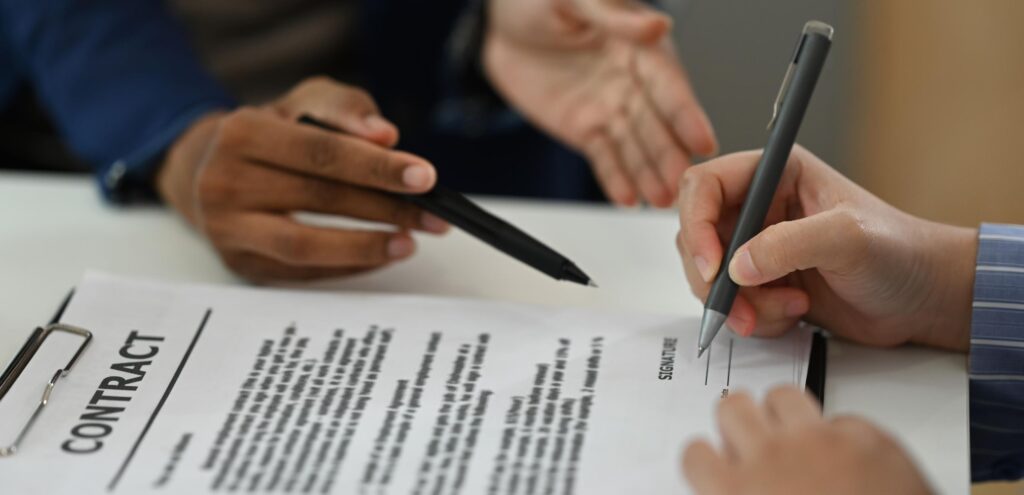A contract is a legally binding agreement between two or more parties. In the Indian landscape, contracts are governed by the Indian Contracts Act of 1872. With the advent of globalization and an increase in trade, the landscape of contracts and agreements has expanded substantially. They essentially form the backbone of business transactions and commercial relationships.
But with such an influx of commercial transactions, merely relying on the existence of a contract does not guarantee any protection against legal risk. A thorough review of contracts serves as a stepping stone against protection from potential legal battles and ensures that such business agreements are certain, fair, unambiguous, and legally sound. This blog post explores the importance of contract review and explains the role of such an exercise in legal risk control and fair negotiation of business transactions.
What is contract review?
In simple terms, reviewing contracts is a meticulous exercise of reading, understanding, analysing, and examining the terms of the contracts to ensure that they are transparent, equitable, and adhere to the legal standards of the country. This is done by ensuring that the language of the contract is unambiguous and transparent, and the clauses are formed in such a way that they analyse potential risks and areas that would require negotiation. The ultimate aim of contract review is to ensure that the interests of all the parties are secured and they align with the legal obligations of the country/ state in which they are enforced.
The Relationship Between Contract Review and Legal Risk Control
It is pertinent to note that all law and business correspond to society in every way possible. This essentially means that with an ever-fluctuating business and legal environment, there is bound to be some risk in all contracts, no matter how watertight they are. Contract review must be an essential part of legal risk management if such risk is to be minimised.
When all parties involved go through the clauses carefully and ascertain that they comply with the relevant laws, then they can foresee the risks and begin mitigating them even before they convert into legal disputes. The experts in contract review make all facts clear concerning the contracts, evaluate their feasibility, and forecast potential risks. Risk contracts then analyse and forecast risks to minimise financial and legal liabilities. These two processes have always been part and parcel of any commercial transaction. For example, an ambiguous clause, such as the one that inadequately defines “late delivery,” if identified in time, can avert disputes that might otherwise go the full tilt of litigation and prove quite expensive.
Best Practices for Effective Contract Review
Industry experts with considerable experience are often able to identify the pattern of risk in similar types of contracts and adopt best practices to ensure a robust contract review. All of these risks have the potential to damage the business’s reputation, and they may also cause monetary and other losses. But a lot of practices can be exercised to protect against such damages. Some of these practices are given below.
- Engaging a legal counsel experienced in the area of contracts and commercial litigation early on can help avoid last-minute changes that delay contracts.
- Ensuring that the contracts do not leave any black spaces and are written in clear, unambiguous and fair language helps mitigate any future risks.
- Carefully reviewing boilerplate terms and having a grasp of its remedies stands as an important factor in the contract review.
- Having clear termination, renewal, and consideration terms helps mitigate risk. Knowing about automatic renewal and opt-out windows helps avoid unwarranted commitments later on.
- Ensuring that the contract is made following the regional, state and national laws applicable.
- Keeping all deadlines, dates, and periods track guarantees timely compliance with the terms and avoids an unconscionable late fee from being imposed on a client.
- Making sure that the risks are equally and fairly divided between both parties, unequal risk is eliminated, thereby allowing further equitable negotiation.
- Familiarising oneself with the basics of various consumer laws, civil laws and important statutes, along with keeping oneself abreast of the various amendments, circulars and legal notifications, etc, can help in protecting against any violation.
Conclusion
Contracts form the building blocks of all business and commercial transactions across the world. They ease the doing of business globally and help create an equal business relationship between the parties. But with an increase in globalisation, business transactions have become increasingly complex. In such a highly globalised business environment, contract review acts as a crucial tool guaranteeing compliance, certainty, clarity and trust.

